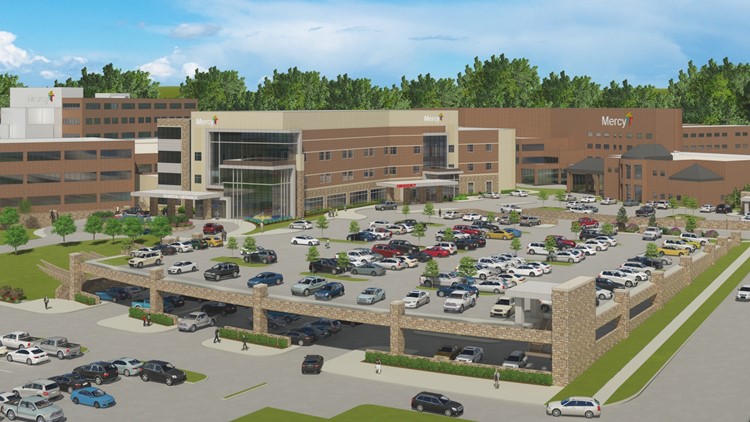FORT SMITH, Arkansas — Mercy Hospital Fort Smith plans on Wednesday (June 30) for a $162 million expansion of its emergency room and intensive care unit.
The ER will be expanded from 29 to 50 rooms and ICU capacity will be expanded from 38 to 64 rooms with a concept that provides better workflow and flexibility.
The new Emergency Department will allow for about 25,000 more patient visits per year and include special considerations for infectious disease as well as behavioral health patients.
An additional 140 parking spaces will be added to accommodate the expansion, with parking closer to the new ER entrance.
“It will increase our ability to care for more patients and will actually improve the care we provide,” said Dr. Paul Bean, Chief of Medical Affairs at Mercy Fort Smith. “It will allow us to expand the services that we provide, which will allow patients to stay in Fort Smith for the care they need.”
The current ER has served Mercy well, although it is not designed to handle the volume, acuity or type of patients seen today, said Ryan Gehrig, president of Mercy Hospital Fort Smith.
“Mercy exists to serve the community, and this investment will allow us to better meet the needs of our community in a world-class environment,” Gehrig said. “We have a very dedicated team of professionals, and this will enable them to deliver this experience our patients expect and deserve.”
Gehrig added that over the past decade, Mercy Fort Smith has worked to add numerous medical services and established itself as a regional health care center.
RELATED: Emergency blood shortage: Arkansas Blood Institute in Fort Smith has less than one day supply
“The increased number of specialists and subspecialists including the addition of three neurosurgeons has allowed us to care for a broader spectrum and higher acuity of patients, many of whom were previously leaving our community for care,” Gehrig said. “We are performing more complex surgeries and procedures, creating additional demand for critical care beds.”
The increase in ICU beds will more than double the number of rooms capable of supporting ventilators. The building automation system is designed to allow for floors or pods to be turned into isolation areas as needed.
“Everything about this expansion will enhance our ability to serve our community,” said Debbie Hewett, director of critical care services at Mercy Fort Smith. “Not only will we be increasing our capacity to better serve our community, but patients and families will be more comfortable in the larger, state-of-the-art rooms with adequate space for family while they visit, whether in the patient room or in one of two family/visitor lounges on each floor.”
The new garage and lower-level emergency department entry will be set up to allow for dealing with a mass casualty event and quick set-up for pandemic response. The ER and main entry proximity will provide separation of non-pandemic from pandemic-related patients without interruption to normal operations, should the need arise.
“We have a talented group of clinicians and realize that we must equip them with the appropriate space and tools to provide high-quality care and deliver a transformative health care experience,” said Bobbie Lamb, director of emergency services at Mercy Fort Smith. “Recognizing that we must grow with our community, we are embarking on an exciting journey, just like the Sisters of Mercy before us. The new department will promote innovative health care while also providing a safer environment for the high-risk patient and vulnerable populations.”
One such provision includes a five-room area for behavioral health patients that is completely secured and designed for patient and co-worker safety.
Additional plans include a 22-bed observation unit requiring no renovation in the former ICU space, helipad relocation that will improve the patient transport process and a new gift shop and meeting room space.
Groundbreaking for the expansion is expected in early 2022, with construction expected to last just over two years. Plans are being developed to minimize the impact to Mercy patients during the construction process.



